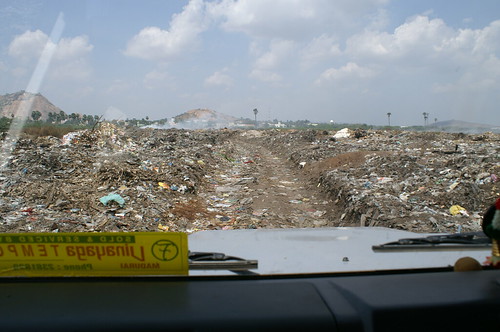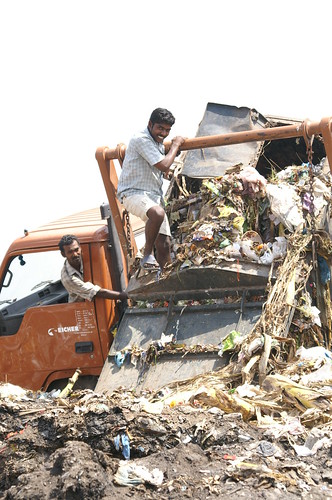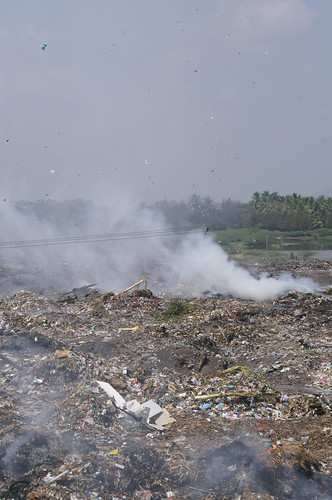Meacheakalai put two mats down on the hard ground for us. The dogs circled and howled. It was getting late, and only the faintest glow seeped from the horizon. As Meacheakalai, his wife and six children sat down on the dirt, on the other side of the courtyard, the lone light bulb swayed ever-so-gently. The family cow stood directly underneath the light, while the rest of the world faded into darkness.
The sound of a massive explosion rumbled across the plains.
"Um," I asked casually, "what was that?"
--
After a chance meeting in Delhi, I came to Madurai to cover the work of an NGO called SHEPHERD. Their work varies widely, but focuses on the empowerment of rural people, especially women. They've also taken to spreading organic farming and tree-planting, with a little help from the New Zealand High Commission.
We'd been through many farms that day, and Meacheakalai's was the last on the list - and the most remote, tucked away behind the folds of dry riverbeds and small, pudding-like rock-hills.
Away from the village, his and two other families worked that piece of land, and they are in the process of converting to organic. Only three of the children are Meacheakalai's - the rest are from the other families, hanging around to see the spectacle: me. Several more children emerged from the darkness, and ranged from babies to teens, from shy to downright camera-hogs. (Excuse the poor photos here - it really was very dark, and I’m not very good at night photography.)
The explosion, he explained through SHEPHERD's Paramasamy, was on a distant quarry. Nearby, a mighty pillar of rock looked concerned.
--
We visited a village that was, literally, the shithole of Madurai. All the sewage and all the rubbish from the city of 1.1 million ended up here. The village made its living by growing crops with the raw sewage.
The sewage came through a number of open sewers, then flowed through irrigation channels and into the fields.
On the other side of the road, there was rubbish. Hills of rubbish. Rubbish so vast, so deep and so thick, there was a road *over* it:
As we drove over hill after hill of rubbish, more trucks came by, struggling to unload as the heaps became higher and higher:
The hellish ambience was complemented by plastic fires; though small, their heat was intense, even against the backdrop of a scorching sun. The fires sent hot air straight up, sucking up swirling pillars of trash.
This was ecological dystopia meets Dante's Inferno. A world with gentle rolling hills of garbage, glistening rivers of raw sewage, diseased crows circling tornadoes of plastic bags.
It was nuts. Just fucking nuts.
--
Of course, the villagers are sick, there are social, economic as well as ecological problems. But the rest will, unfortunately, have to wait until someone gives me money. I’m saving the A-material for an article that I hope will be published in New Zealand’s favourite weekly mag for lonesome housewives. In the meantime, feel free to browse through my photos on Flickr.
I’ll be posting more about the gypsy village at some stage.
(I’ve finally forked out my $25 USD, a goddamn decade after all the cool kids have done it, and spent the last three days uploading and sorting photos. Dangerous combination: Giving a jobless obsessive-compulsive a *sorting-engine*, five hundred photos, half a dozen dimensions to sort by and near-unlimited space for filling out details (that need, of course, to be accurate). It still irks me that the camera had the wrong time for the first set, and I don’t have a point of reference to reset it to the right time.)
ANYWAY…
The experience was pretty goddamn awesome. Sitting around with a farmer, chatting about the price of rice. Surrounded by a simple farmhouse and the wide-open plains, nothing stirring except for cicadas and several hundred sticks of dynamite levelling a hill.
And of course, the little slice of hell. It was terrifying, but an absolute privilege to see.
I’m pretty glad I decided to be a journalist. You get to see all sorts of, um, shit. Who else would have people taking them to refuse wastelands? For free, even!
This gig rocks.
This trip was made possible with help from the Asia:NZ Foundation, who gave me money. I encourage you to do the same.


